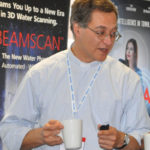Discovery of the ‘God particle’ was like finding the missing piece in a vast jigsaw – we knew what it needed to look like to complete the picture, but what if it didn’t fit? A University of Liverpool event explores where faith meets science.
As international scientists converge on Liverpool to discuss the Future Circular Collider (FCC), a successor to the CERN Large Hadron Collider that promises to take us further back to the start of time, the University of Liverpool Physics Department is hosting the event ‘Physics and Faith’ at Liverpool Cathedral on 8th February 2022. It will explore how a journey into the unknown takes a combination of faith, philosophy and science.
On the panel is Canon Scientist Dr Mike Kirby, a medical physicist who balances his work in cancer therapy with his work as a priest. He also gives talks in schools about anti-matter, dark energy and the size of the universe – and how incomprehensible it is: “People often think that God is in the gaps in our knowledge, and gets squeezed out when new discoveries are made. But there’s about 97% of the universe we don’t know about, which is a pretty big gap for God to be in”.

Dr Kirby continues: “The big difficulty for science, as we have seen over recent months, is to explain what we know with any certainty. Science does come up with models for trying to understand what we see and observe within the universe, but science can’t answer certain questions, about life, love and emotions, for example. This is where spirituality, faith, and talking in different ways can help us to try to have a handle on this mystery that is life.”
The Future Circular Collider will be four times the size and six times as powerful as the Large Hadron Collider (LHC), and will be used to better understand particle science and the forces of the universe.
Technologies such as the World Wide Web, computer chips, proton-beam cancer therapies and novel materials are all part of the rich legacy that the LHC has contributed to society. Professor Carsten P Welsch, Head of the Physics Department at the University of Liverpool, explains that the FCC will push the frontiers of knowledge still further.
“Science knows no boundaries, as we have seen with the international effort to tackle the pandemic. Having an exciting goal creates ambition and vision. The Future Circular Collider provides such a focus. The world today has been transformed by computer technologies, spinning out from work on particle science, but now more than ever there is a role for philosophy and faith in shaping a future that we all want.”
More information at liverpoolcathedral.org.uk

